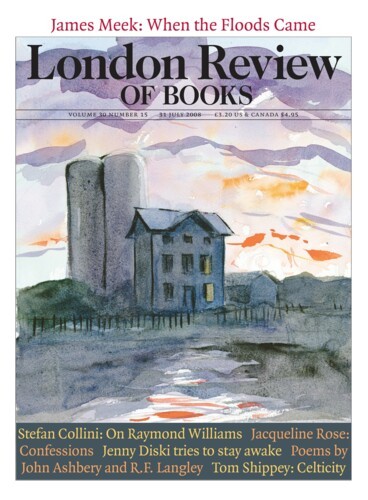I paid my electricity bill today, and spent some time trying to work out how much of my bill goes to the French government to defray the costs of running that large, complex and hexagonal country. I don't live in France. I live in London and, like millions of other Britons, buy my electricity from EDF, aka Electricité de France, which snapped up three of England's privatised electricity minnows in 2002. Privatisation, a policy supposed to liberate us from the burden of allegedly inefficient state-owned industries, has led to more than five million households and businesses in this country buying electricity and gas from a state-owned industry in that country.
James Meek
James Meek is a contributing editor at the LRB. His new novel, Your Life without Me, will be published in 2026.
When the Floods Came
31 July 2008
When the Floods Came: England’s Water
James Meek, 31 July 2008
Looking through the photographs I took in Tewkesbury in May, I found two pictures of Chuck Pavey and his floodwater hand. There’s Pavey, a 66-year-old retired electrician in a Manchester United hooded top, a wispy white pageboy haircut and dark glasses, standing by a wall on the bank of the River Avon. He’s holding his right hand horizontally in the air, about thirty centimetres above the top of the wall, which comes up to his waist. The olive-coloured Avon ripples away, three or four metres further below. In the background is an arched pedestrian bridge, a willow tree with its lower fronds stroking the water, and the massive red brick wall of a derelict flour mill. In the next picture, Pavey is standing next to the freshly whitewashed wall of the White Bear pub, looking more agitated, as if he’s afraid I still haven’t got the point. It’s the same stance, except that this time the hand has risen above his head. It hovers about two metres above the level of the road; it comes three-quarters of the way up the casement of the pub window. I got the point. If you’d tried to stand where Pavey was standing on Monday, 23 July 2007 – the day water levels peaked in Tewkesbury – you’d have been treading water.
Dead Not Deid: A Great Radical Modernist
James Meek, 22 May 2008
The opening story in James Kelman’s 1998 collection, The Good Times, is called ‘Joe Laughed’. It’s nine pages long and is told from the point of view of a boy who plays football on a patch of waste ground among derelict industrial buildings by the river in a large, unnamed city which British readers are bound to assume is Glasgow. You don’t find out the boy’s name, or his age, although hints and the boy’s style of reflection encourage you to guess he’s between 14 and 16. At half-time, the boy and two friends start exploring an abandoned factory. After a bit, the boy’s friends hit him and run away laughing.
Hooyah!! The Rise of the Private Army
James Meek, 2 August 2007
In a James Bond film, viewer credulity gets its toughest workout with the hero’s tour of, and subsequent escape from, the villain’s lair. This power-crazed evil genius, this smug gentleman in a tightly tailored suit posing as a bold entrepreneur: how was he able to construct a paramilitary base over a dozen square miles in the middle of, say, the United States, without its raising an eyebrow among the local constabulary? How did he get the zeppelin hangar past the county planning board? Such vast amounts of concrete. Such tunnels, such golf-carts, such fleets of helicopters armed with machine-guns. Such tours of firing ranges where hired muscle in beige boiler suits incinerates cardboard targets with grenades and automatic weapons. ‘What do you think of our little playground, Mr Bond?’
Podcasts & Videos
Putin's Mistake
James Meek and Thomas Jones
James Meek talks to Tom about the events leading up to Russia’s invasion of Ukraine, from the fall of Yanukovych to the wars in the Donbas and Nagorno-Karabakh, and considers what may happen next.
Between Mykolaiv and Kherson
James Meek
James Meek reports from Mykolaiv and the area of southern Ukraine that has become a crucial battleground in the war, as Russian forces seek to maintain control of the land they’ve occupied west of the...
Between Mykolaiv and Kherson
James Meek and Thomas Jones
James Meek, recently returned from Mykolaiv, talks to Tom about the area of southern Ukraine that has become a crucial battleground in the war, as Russian forces seek to maintain control of the land they’ve...
Shamed in Afghanistan
James Meek
James Meek reads from his piece on the British army’s eight years in Afghanistan.
Robbing the Poor
James Meek
James Meek argues that the Robin Hood myth has been turned on its head by the wealthiest and most powerful, so that those who were previously considered 'poor' are now accused of wallowing in luxury.
James Meek: Dreams of Leaving and Remaining
James Meek
James Meek talks to Chris Bickerton about his new book, Dreams of Leaving and Remaining, which features writing published originally in the LRB.
Tony Wood and James Meek: Russia without Putin
James Meek and Tony Wood
Tony Wood talks to James Meek about his book Russia with Putin, which looks at, among other things, the legacy of Soviet infrastructure and the extent of political opposition in today’s Russia.
James Meek on Healthcare: from WHO to NHS
David Runciman and James Meek
David Runciman talks to James Meek about what the Covid crisis has revealed about how we understand healthcare and how we think about the organisations tasked with delivering it. Their conversation covers...
Pieces about James Meek in the LRB
Planes, Trains and SUVs: James Meek
Jonathan Raban, 7 February 2008
James Meek’s last, bestselling novel, The People’s Act of Love, published in 2005 to great critical acclaim, was set in 1919, in ‘that part of Siberia lying between Omsk and...
Dynamite for Cologne: James Meek
Michael Wood, 21 July 2005
James Meek’s early fiction is alert, acrid and funny, and only slightly too insistent on its own quirkiness – as if it were hoping reviewers would call it surreal (they did) and...
Read anywhere with the London Review of Books app, available now from the App Store for Apple devices, Google Play for Android devices and Amazon for your Kindle Fire.
Sign up to our newsletter
For highlights from the latest issue, our archive and the blog, as well as news, events and exclusive promotions.




